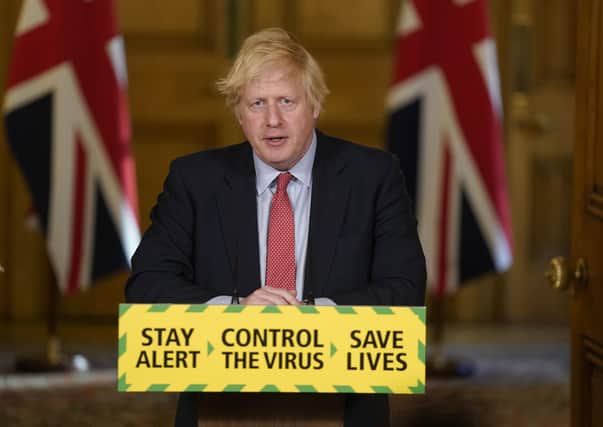Lives at risk as Johnson and Cummings lose ‘fear factor’ – Matthew Flinders


As such, the role of the modern state is driven by the public’s desire to avoid those fear-inducing elements of modern life.
But that does not mean the role of the state is to eliminate fear. Rather it needs to manage what might be termed the “fear factor”. This is the fine line between using fear to encourage public compliance with the law (i.e. fear of prison is itself a preventative strategy), while at the same time convincing the very same people that they don’t need to live in a constant state of dread, anxiety and fearfulness.
Advertisement
Hide AdAdvertisement
Hide AdUsing but not abusing the fear factor is, therefore, one of the most central but least discussed elements of political life. The Government must maintain a delicate equilibrium. It must wear an iron first in a velvet glove. Never before in peacetime has the fear factor become so explicit than during the Covid-19 crisis. The Government has needed to maintain calm but also convince the public to recognise the scale of the health threat and to abide by the lockdown rules.


And most people did respond to the fear factor. They acknowledged the risks, played their role and stayed at home.
But whether they will continue to do so now looks highly uncertain. Experts know how important the fear factor is in managing a pandemic. The US Centre for Disease Control’s Field Epidemiology Manual emphasises the importance of effective risk communication to stimulate sufficient “risk perception” – fear – in vulnerable populations during an outbreak. Predictably, clarity is considered key to this: clarity regarding the threat and clarity about what people should do to mitigate the threat.
And, in this, the Westminster government has failed. It has lost control of the message and has put lives and livelihoods at risk.
Advertisement
Hide AdAdvertisement
Hide AdBoris Johnson had already muddied the message on May 10 when he shifted the official advice from “stay home” to “stay alert”. In allowing his desire to please to trump restraint, he caused public confusion.


As if that were not bad enough, Johnson has defended his chief aide Dominic Cummings. While the rest of the country was sticking to the Government’s diktat, Cummings had driven to the other side of the country while his wife had symptoms.
Had he broken the rules? “No,” the Prime Minister told the nation, Cummings had acted “responsibly, legally and with integrity”. It was “instinct” rather than ignorance or arrogance that had led him to Durham.
That, in Johnson’s book was absolutely fine. But Stephen Reicher, a member of the Government’s own advisory committee on behavioural science, said: “In a few short minutes Boris Johnson has trashed all the advice we have given on how to build trust and secure adherence to the measures necessary to control Covid-19.”
Advertisement
Hide AdAdvertisement
Hide AdLike a bubble being burst, any public fears surrounding lockdown had suddenly dissipated. If there is one rule the British public won’t stand it’s the one that seems to apply to the many but not to a chosen few.
The shift in official messaging had already replaced precision with confusion. Now, the public finds that a powerful figure not only felt fearless enough to break the rules but has done so with no repercussions for him whatsoever.
Even before these revelations, we have seen people – many of whom may fear lack of wages more than the virus – pack into public transportation to go to work. Others will surely follow now.
The question now is whether Johnson will bounce back from yet another calamitous decision and how he seeks to reconcile it with his persona. He has always been a populist politician. He longs to be loved and is therefore reluctant to tell the public the simple truth that – as Bernard Crick wrote 50 years ago – politics cannot make “all sad hearts glad”.
Advertisement
Hide AdAdvertisement
Hide AdJohnson’s need to please combined with his personal fears – the loss of his carefully calibrated image as the jumping, japing jester – may well have affected his ability to understand and use the “fear factor”. And yet, at the same time, his obvious reliance on Cummings has popped his populist pretensions.
Dominic “man-of-the-people” Cummings and Boris “slightly-less-man-of-the-people” Johnson suddenly appear willing to defend the indefensible; that there really is one rule for them and a different one for everyone else.
Once lost, the fear factor is hard to restore. Once the public has become fearless rather than fearful in relation to any topic or threat, it becomes almost impossible to use fear in a constructive, pragmatic and evidence-based manner.
With the potential for a second coronavirus spike being a very real risk, the fact that Johnson baulked may well come back to haunt him.
Advertisement
Hide AdAdvertisement
Hide AdMatthew Flinders is a professor of politics at the University of Sheffield.
Editor’s note: first and foremost - and rarely have I written down these words with more sincerity - I hope this finds you well.
Almost certainly you are here because you value the quality and the integrity of the journalism produced by The Yorkshire Post’s journalists - almost all of which live alongside you in Yorkshire, spending the wages they earn with Yorkshire businesses - who last year took this title to the industry watchdog’s Most Trusted Newspaper in Britain accolade.
And that is why I must make an urgent request of you: as advertising revenue declines, your support becomes evermore crucial to the maintenance of the journalistic standards expected of The Yorkshire Post. If you can, safely, please buy a paper or take up a subscription. We want to continue to make you proud of Yorkshire’s National Newspaper but we are going to need your help.
Advertisement
Hide AdAdvertisement
Hide AdPostal subscription copies can be ordered by calling 0330 4030066 or by emailing [email protected]. Vouchers, to be exchanged at retail sales outlets - our newsagents need you, too - can be subscribed to by contacting subscriptions on 0330 1235950 or by visiting www.localsubsplus.co.uk where you should select The Yorkshire Post from the list of titles available.
If you want to help right now, download our tablet app from the App / Play Stores. Every contribution you make helps to provide this county with the best regional journalism in the country.
Sincerely. Thank you.
James Mitchinson
Comment Guidelines
National World encourages reader discussion on our stories. User feedback, insights and back-and-forth exchanges add a rich layer of context to reporting. Please review our Community Guidelines before commenting.